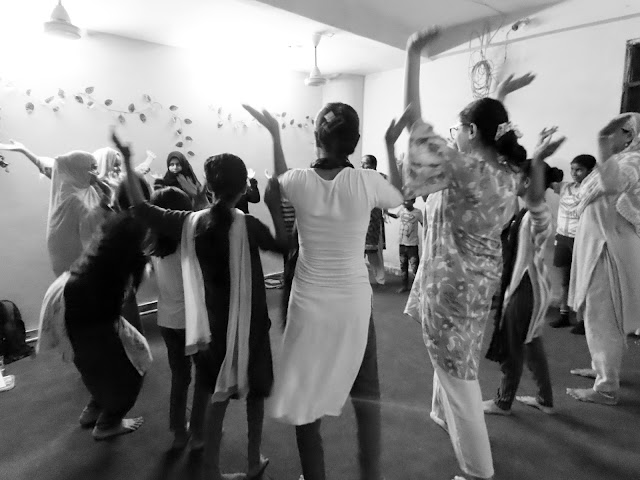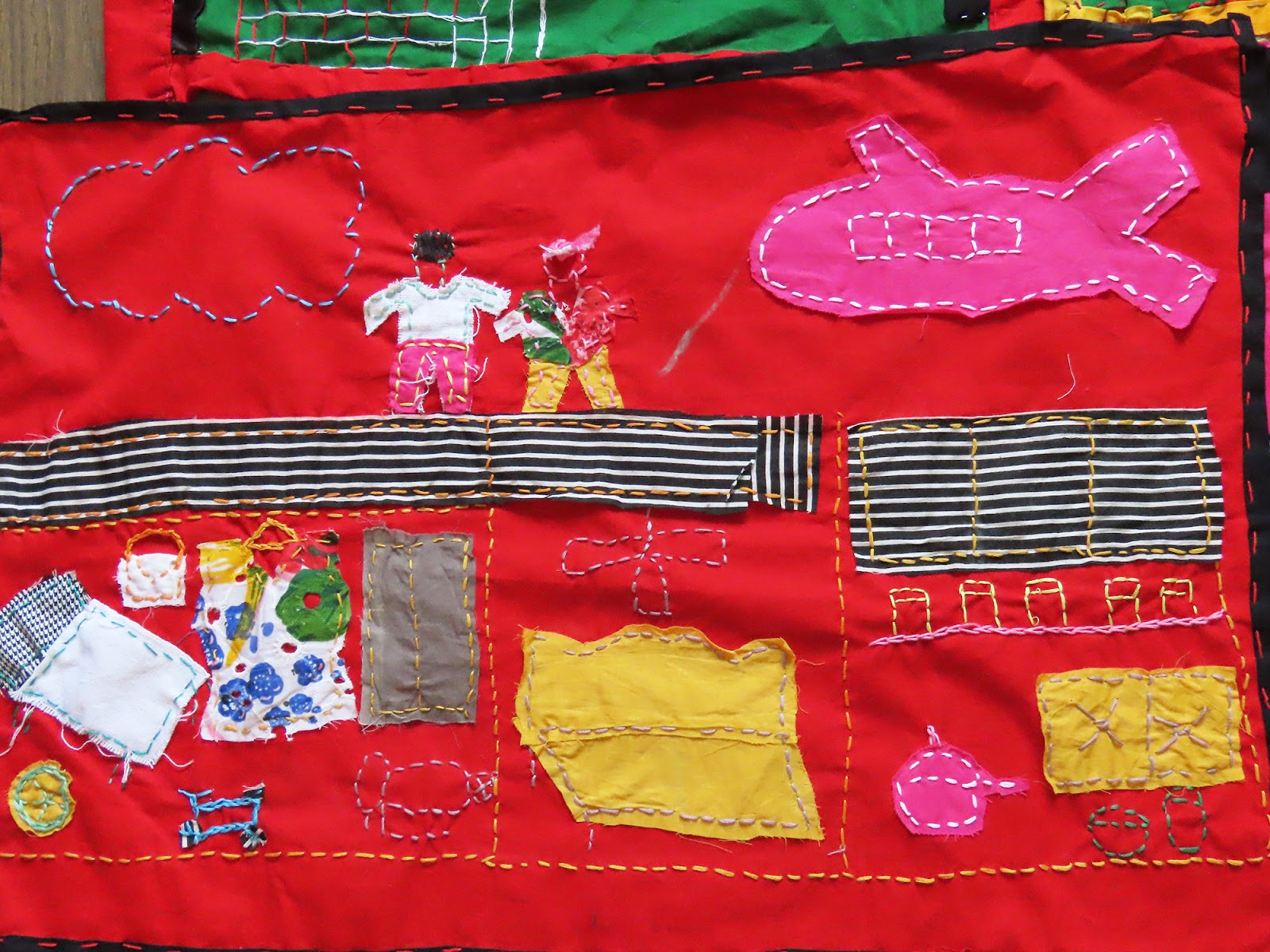In a country where the marginalized are often swept out of sight or rendered invisible in the name of beautification while hosting global events, beauty is rarely extended to them, depriving them of basic necessities, greenery, and dignity. Women in these neighborhoods suffer the most and are often denied spaces to rest, find joy, and express themselves freely.
Yet, in a small room tucked away in one of New Delhi’s most disadvantaged neighborhoods, women have found a place of sukoon (peace), fursat (leisure), masti (fun), and made it beautiful with their presence, stories and embroidered works that decorate every nook and corner of this space.
 |
| Rafooghar- the community space decorated with women’s powerful stitched artworks. |
 |
| Photograph by Harmeet Basur |
Women from these communities are always engaged in labor, both physical and emotional, with little time for self-care. They are always expected to be productive, juggling multiple tasks at all times. In the initial days, many women found it challenging to take out even an hour to spend at the space. Some women would bring their children along because raising children remains largely a mother’s responsibility; while others would abruptly be called back home by family duties, unexpected guests, or their employers’ demands.
 |
| "All I want is some moments of peace" - Gulafsha |
An embroidered artwork by Gulafsha who just wants some peace and free time. Her idea of ‘sukoon’ is tucking her four children and husband in bed before embarking on a solo adventure in her husband's auto. She fondly recalls another special and peaceful moment when they stood together under an umbrella in the rain.
The only reason they get ‘permission’ to come here is because it's just for Silai (stitching)- an acceptable, non-threatening activity, fitting neatly within traditional gender roles.
 |
| Movement based ice breaking session facilitated by Artreach India |
But here in this space, stitching is not just a chore or a means of livelihood; it’s a tool for women to express themselves, feel heard, and valued.
Rafooghar draws its inspiration from the word Rafoogar—a traditional Indian master darner or cloth mender. Rafoogars are not just skilled artisans who invisibly repair damaged garments; they are also healers who breathe new life into these torn fabrics. In the same spirit, Rafooghar—The House that Mends—is a space where women gather to share their stories, release their emotions; repair their emotional wounds; restore their broken selves and relationships; rejuvenate and resist the erasure of their identities through the mediums of stitching and textiles.
 |
| women from Jasola and Shaheen Bagh sitting together and stitching 'Love Lihaaf' - a community quilt made by piecing together individual narratives of everyone |
 |
| “I spend a lot of time at home. I love looking at flying planes from my terrace".-Shahista |
In marginalized communities, often, the mental well-being of women goes unnoticed-even by the women themselves. There is frequently a lack of vocabulary to articulate their mental health concerns, and therapy is often unaffordable and inaccessible. The slow and repetitive process of stitching offers a space for self-reflection and therapeutic benefits. Stitching, combined with other interventions, has been shown to reduce anxiety, depression, and PTSD symptoms, particularly in the context of trauma related to gender-based violence. Practicing stitching collectively provides an opportunity to build bonds and create a culture of care.
 |
| Haal Khayal Module - Mark making for Mental well-being facilitated by Ahmedabad-based textile artist-Hansika Sharma |
Our modules are, therefore, thoughtfully designed to promote mental well-being while delving deeper into themes of identity, agency, and mobility. Created in collaboration with Artreach India, art therapists, educators, our community contact Yusra Khan from Yellow Streets, and the women of Rafooghar, each session focuses on the issues and needs of the community women. We begin with movement and theatre-based ice-breakers, followed by art warm-ups and stitching prompts centered around a theme. Sessions conclude with a sharing circle to spark conversations and discussions around the stitched stories, as well as to address challenging issues.
This space and community support also encourages several of them to break their silence, seek help, and take steps towards healing and justice. A fifteen year old girl, after three years of domestic abuse, finally found the courage to file an F.I.R against her husband and her in-laws.
 |
| Rafooghar participants with ‘‘Umeed ka karavaan’- the travelling quilt of hopes and dreams. |
Rafooghar is only a year old, yet it has already brought about significant changes in the community, simply by giving women a place to rest and the creative outlet of stitching. Women who once hurried to leave now stay for hours, even after the sessions end. They have also started leaving their kids at home with husbands taking care of them as well as some household chores, a significant change since they previously had no break from childcare responsibilities. The right to rest has allowed these women to recharge, reflect, and reinvent themselves.
It’s been a packed year for them ever since their first community exhibition Daastaan-e-Rafoo: Stories in Stitches. They've showcased their work at major events like the India Art Fair and the 19th Asian Women’s Film Festival, taking on new roles by assisting in workshops and exhibitions. Some have even represented Rafooghar internationally at the Participatory Design Conference in Malaysia, and others will soon be traveling to Thailand for the AWID Forum. They have just started a study group to teach themselves English and are now dreaming of bigger things to rewrite their destinies.
 |
| Rafooghar participants with "Umeed ka Karavaan" - the travelling quilt of hopes and dreams |
 |
| Daastan--Rafoo: Stories in Stitches at the 19th Asian Women's Film Festival. Photograph by Antasa Vairagya |
Pooja Dhingra is an independent conceptualiser, art director and graphic designer. She is the founder of Compassion Contagion, an online archive that has been documenting acts of compassion, hope and resilience through art. She spends her Sundays at Rafooghar (the house that mends), a community space where women who live on the margins and face social exclusion gather for sukoon (peace) and (fursat), share and stitch their stories and lived experiences on fabric.
Pooja's personal work revolves around waste management, sustainability, and addressing the patriarchy through humor and satire.



No comments:
Post a Comment